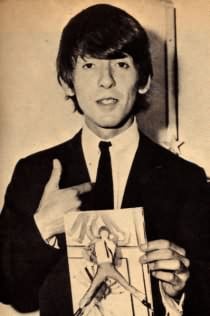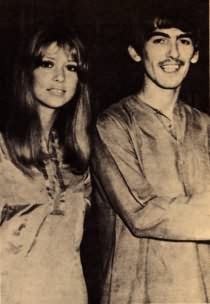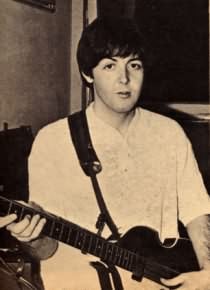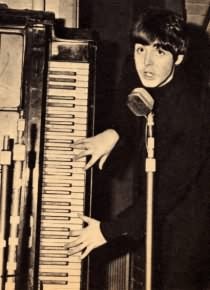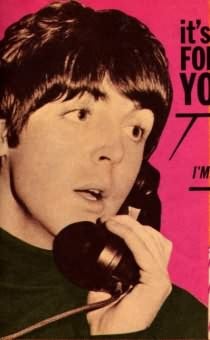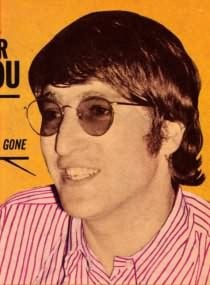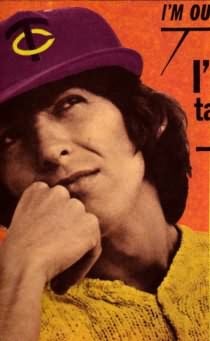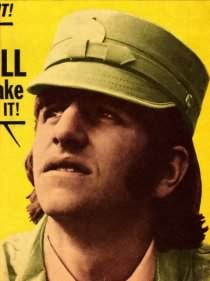The Beatles & Me
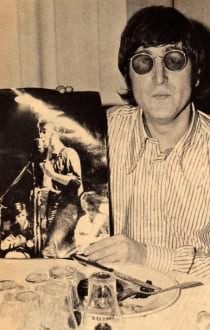
The rain in Spain is mainly in the plain, but it blew up a storm when John celebrated his 26th birthday on a Spanish hillside. Read all about it—and be the first-est with the latest happenings to Ringo, George and Paul, too!
On the evening of Saturday, October 8, 1966, John Lennon celebrated his 26th birthday in an apartment in Almeria, Spain. Officially, he was 26 on Sunday, October 9th, but the party took place the night before because John was about to move to a new location. At the time, we had been in Spain just over three weeks for location work on the Richard Lester movie, How I Won The War, in which John plays the part of Corporal Gripweed—a faithful, slovenly and slightly cowardly servant/“batman” of Lieutenant Goodbody (Michael Crawford) of the British Army.
The entire production unit for the movie got an open initiation to the birthday shindig and, believe me, it was quite a wild night! Almeria is a pretty remote spot—minus most forms of conventional night life, so that party was one of the few really successful social occasions of the month.
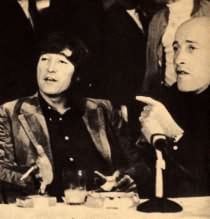
John and Cyn had become very friendly with Michael Crawford and his wife, who were renting an apartment nearby. Already the Crawfords were finding themselves a bit cramped, because they had their lovely little six-months-old baby with them and a nanny. And Ringo had arrived with Maureen for a holiday three days before the birthday party!
“You know what we ought to do?” John suggested one evening, just after we’d heard that Ringo and Maureen were coming to Spain. “We should all get together and rent one of those fantastic old villas outside the town.”
The Crawfords loved the idea and the move was organized without delay. The apartments were very attractive and comfortable—with a wonderful view looking out over the sea. But everyone wanted more space to move around in and larger “get-together” rooms for entertaining. So, on the Sunday of John’s birthday, we moved into the Villa Corjo-Romera, a magnificent, rambling old Spanish villa standing on a hill outside the town.
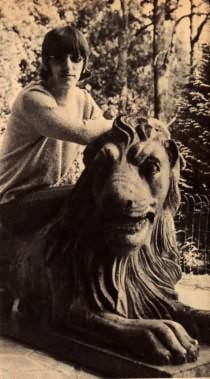
“It’ll take days just to explore this place,” John declared, as we walked from room to room on the initial tour of the villa. We admired all the heavy woodwork, the superbly decorated ceilings and the majestic main hall.
“Just like something out of a film,” Ringo decided. “You expect all kinds of heroes with swords to come swinging ’round the corner on a chandelier! And what a great place for parties!”
“That’s it,” replied John. “A party! It’s my birthday. We should have one.”
“We did that last night,” I put in weakly.
“Well we’ll do it again tonight,” John said. “It can be called a villa warming if you like.”
“Hey you’ve got a game room,” Ringo said. Let’s have a go at table tennis later.”
That night’s “villa warming” party coincided with one of the worst storms Almeria had ever experienced in living memory. Normally, the locals expected no more than about five days of rain each year. This storm took everybody by surprise. The rain was torrential and it was accompanied by a fierce wind. The party was just getting underway when the all the lights went out, so we rushed ’round trying to find where the fuses were located. We needn’t have bothered. The electricity supply cables for the entire area had been damaged by the storm. And the telephone lines were down, too. Finally, we found enough candles to light the place. In the end, the candlelight added to definitely romantic atmosphere to the party, and the power cut had turned out to be a novel advantage rather than a disaster.
It goes without saying that there was no film work done on Monday. The location set had been washed away by the rain. (After all, this was the desert sequence—and floods just don’t happen in deserts!) The water supply for the villa came from a well, but the pump was worked buy electricity. It wasn’t until late Tuesday afternoon that electric power was restored. So we spent Monday devising ways of eating and existing comfortably without the use of water or electricity.
The restoration of the power coincided with the arrival of our cook. So at about three o’clock Tuesday afternoon we all sat down to a late breakfast of sausages and eggs.
“This, I am really looking forward to,” said John, and the girls put on a look of mock annoyance. “Not that I’m saying a word against your cooking, but even you two can’t work wonders without water.”
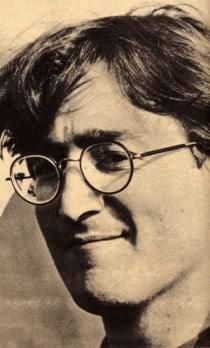
John and I had left for Germany to begin work on How I Won The War less than a week after the Beatles’ American tour. By now it must be a matter of well-known historical fact that John’s ceremonial haircutting took place at the unearthly hour of 7:30 a.m. on the morning of Tuesday, September 6, 1966! The “operation” was supervised by the film’s producer/director, Richard Lester, and carried out by 28-year-old German hairdresser Klaus Baruch, of Hamburg. He came to our small vacation-type hotel in the forest of Luneberg Heath to perform his grave task. John’s familiar fringe was swept back and greased down a bit to transform him into Corporal Gripweed. The addition of the grubby old army greatcoat plus a pair of very plain specs completed the change from Beatle to “batman.”
Don’t believe any claims people might make about possessing some of John’s clipped off hair. I watched the famous locks of hair burning away to nothing while we were at Luneberg!
We got one completely free day in Germany and John took the opportunity of re-visiting some of his favorite haunts in Hamburg. We couldn’t make the rounds of the Hamburg club scene because we had to be up so early the following morning. Instead, John went on a shopping spree and picked up an assortment of shirts, shoes, jeans and other accessories from stores he knew well from the Beatles’ days in Hamburg five and six years ago. It was a fascinating day for John since many of the places familiar to him had greatly changed since 1960.
We finished filming in Germany on Wednesday, September 14. By coincidence, that was the day that a “Mr. And Mrs. Sam Wells” flew from London Airport on a BOAC plane bound for Bombay. At Bombay’s Taj Mahal Hotel, it wasn’t long before Mr. And Mrs. Wells were recognized, and Mr. Wells, alias George Harrison, let himself be pressured into admitting his true identity and explaining to the local press his motives for that extended Indian vacation trip: to study the sitar and everything to do with Asian music.
Meanwhile, back at How I Won The War, John and I left Hamburg by the night train to Paris in the small hours of Friday, September 16th. And at the same time (or a few hours later), Brian Epstein left London for Paris accompanied by Paul McCartney. We all met in Paris—just for the weekend, because filming in Spain was due to start early the following week. The flight from Paris to the Spain was fast—and the longest and most tedious part of our journey was yet to come. From the airport at Malaga, we faced a five hour drive to Almeria, which is, as I said earlier, a bit of remote spot. We drove along what the Spanish fondly imagine are highways but are, in fact, more like dirt tracks with superficial tarmac coating. For most of the way, the “road” runs alongside the sea—I mean alongside, because I reckoned we would plunge straight down into the waves at any second.
The living in Spain was a bit rough, but nobody minded. By now, most of the cast had become firm friends. Although John and I had made a particular mate of John Crawford, we were equally close with all the other actors. Like Ronald Lacy, who is Spool in the picture; Lee Montague, who is Transom (“Corporal of Musket and Troop Sergeant”); Roy Kinnear, who is Clapper; and Michael Hordern, who plays out Lt. Col. Grapple. Each morning we would be up by 7:30 to leave no later than 8 a.m. John had his own driver and Rolls with him. The Almeria inhabitants were thoroughly impressed with this vehicle, and John caused a great stir each day as we drove out of the town. The local people described the Rolls as the “Royal Hearse.”
Once we’d left the town each morning, that was it for the whole day. At the actual film location, we spent most of our spare time watching what was happening or sitting around on the floor of an old bus (no seats) which was used as the company wardrobe and the cast’s the dressing room. Between 8:30 a.m. and 9, John went through the makeup process of becoming Corporal Gripweed, and the next four hours were spent in front of the cameras. The lunch break was from twelve to one. We were well looked after, despite the lack of facilities on the location. We all sat ’round in a big and very hot tent eating excellent lunches, with things like melon, filet steak and fruit.
Most of our evenings were spent quietly. Sometimes, John would go through his lines for the following day, with me correcting him and filling in all the other parts. Just for laughs, we would rewrite whole scenes for ourselves, which got a bit confusing. So sooner or later, we’d call each other to order and get back to the script-learning bit. I’m not sure exactly where Corporal Gripweed was born and raised, but John has given him a definitely Liverpool origin.
When Ringo and Maureen joined us at Almeria on Wednesday, October 5th, only one of the boys remained in England. That was Paul, who was still in the process of putting the final interior furnishing touches to his new house at St. John’s Wood in North London. In any case, he wasn’t ready to take an overseas vacation at that stage, because he had started work on the soundtrack musical score for the Hayley Mills’ film, All In Good Time.
So, by the final week of October, the all-around situation on the Beatle-front was this: George, with yoga experience, sitar lessons and a mustache, was located in a picturesque house beside a lake not too far from Bombay, India; Paul was in London, watching different bits of the Boulting Brothers’ film and writing the background music for each scene; and Ringo was taking it easy in Spain and watching John working on the final segments of How I Won The War. Now there was an interesting dispersal of talents and occupations, if there ever was one!
See you next month!
- Magazine: 16
- Volume: 8
- Issue: 9
- Published: February 1967
- Publisher: 16 Magazine, Inc.
- Author: Neil Aspinall
- Page: 18–22
